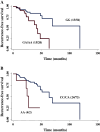Roles of genetic variants in the PI3K and RAS/RAF pathways in susceptibility to endometrial cancer and clinical outcomes
- PMID: 22146979
- PMCID: PMC3526101
- DOI: 10.1007/s00432-011-1103-0
Roles of genetic variants in the PI3K and RAS/RAF pathways in susceptibility to endometrial cancer and clinical outcomes
Abstract
Purpose: The phosphatidylinositol 3-kinase (PI3K)/PTEN/AKT/mTOR and Ras/Raf/MEK/ERK pathways have been implicated in endometrial tumorigenesis. In this candidate pathway analysis, we investigated associations between genetic variations in these two pathways and both risk and clinical outcomes of endometrial cancer.
Methods: We genotyped a total of 48 potentially functional SNPs in 11 key genes (AKT1, AKT2, AKT3, BRAF, FRAP1, KRAS, PDPK1, PIK3CA, PIK3CB, PIK3R1, and PTEN) with the Sequenom genotyping platform in 115 endometrial cancer patients and 230 cancer-free women to evaluate their associations with risk, survival, and recurrence of endometrial cancer.
Results: We found the following: (1) PIK3CA rs6443624 and rs9838411 variants either borderline or significantly decreased risk of endometrial cancer in a dominant model (adjusted odds ratio [OR], 0.62; 95% CI, 0.39-1.00 and 0.59; 95% CI, 0.36-0.95, respectively). Furthermore, there was a statistically significant multiplicative interaction (P (int) = 0.036) between these two loci in risk of endometrial cancer. In contrast, the AKT1 rs2498801 genotype significantly increased risk of endometrial cancer (adjusted OR, 1.94; 95% CI, 1.02-3.67 in a recessive model). (2) In Cox regression analyses, three SNPs (PIK3R1 rs1862162, AKT2 rs892119, and PIK3CA rs2699887) showed significant associations with survival of endometrial cancer patients. (3) KRAS rs7312175 and PIK3CA rs6443624 had significant effects on recurrence of endometrial cancer individually and combined in a locus-dosage manner (adjusted P (trend) = 0.003).
Conclusion: These results suggest that common genetic variations in these pathways may modulate risk and clinical outcomes of endometrial cancer. Further replication and functional studies are needed to confirm these findings.
Figures

References
-
- Abal M, Planaguma J, Gil-Moreno A, Monge M, Gonzalez M, Baro T, Garcia A, Castellvi J, Ramon YCS, Xercavins J, Alameda F, Reventos J (2006) Molecular pathology of endometrial carcinoma: transcriptional signature in endometrioid tumors. Histol Histopathol 21(2):197–204 - PubMed
-
- Akhmedkhanov A, Zeleniuch-Jacquotte A, Toniolo P (2001) Role of exogenous and endogenous hormones in endometrial cancer: review of the evidence and research perspectives. Ann N Y Acad Sci 943:296–315 - PubMed
Publication types
MeSH terms
Substances
Grants and funding
LinkOut - more resources
Full Text Sources
Other Literature Sources
Research Materials
Miscellaneous

